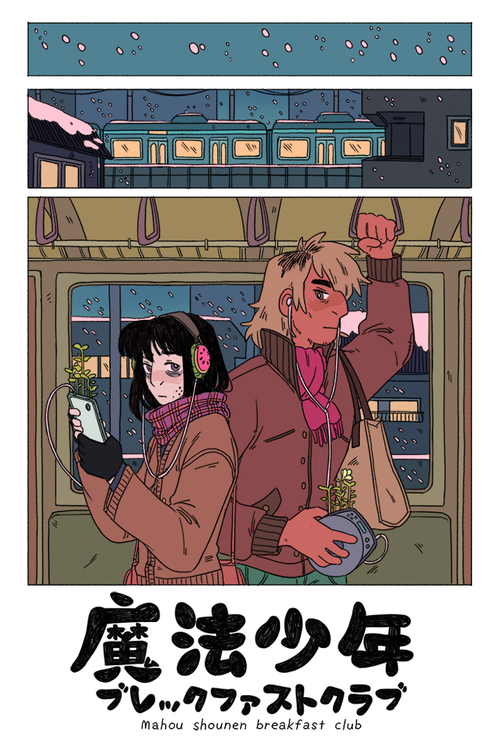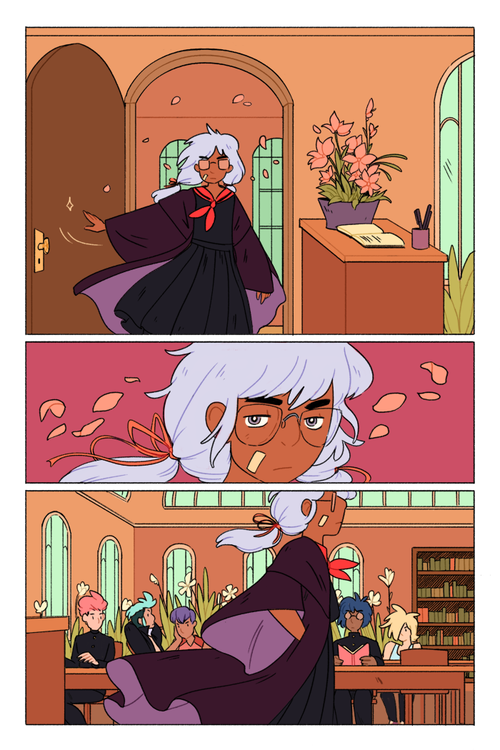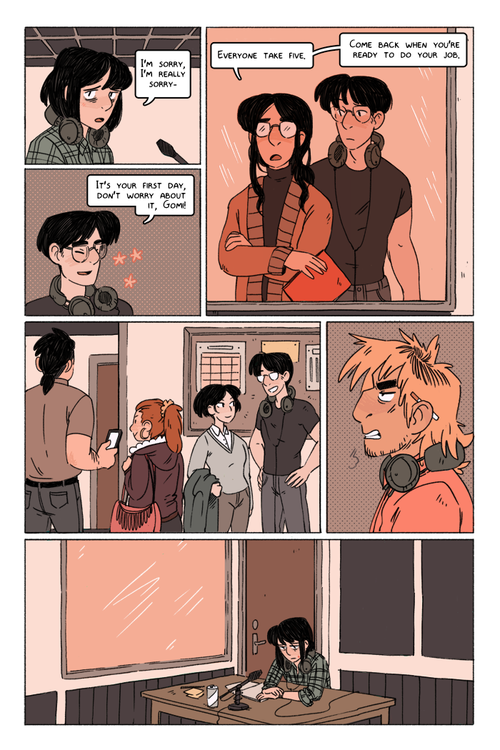Author’s note: When returning to my writing from a short internet hiatus, I came across the MSBC “scandal” after it had generally run its course. I wanted to think about root causes and talk about the responsibilities of artists and critics. I hope that this piece causes you to pause, at least for a minute, and think. Thanks.
———————————
Bantu knots. Moccasins. Hand pies. Color runs.
Hummus. Twerking. White people (white Americans in particular) are really good
at “discovering” culturally significant things and stripping them of their
heritage and identity. This act, called cultural appropriation, or colloquially
“Columbusing,” after the genocidal explorer for which the USA has a national
holiday named, is a constant practice in the West. And as is often the case,
cultural appropriation often comes with white supremacy and racism in tow.

Mahou Shonen Breakfast Club (MSBC), a highly anticipated
webcomic by Toril Orlesky and Katie O’Neill about two Japanese voice actors set
in modern day Japan, was recently embroiled in controversy and was subsequently
shut down by its authors. Orlesky and O’Neill were questioned about the motives
of the work, and their responses and the follow up discussion led to some
extremely heated arguments. More extensive write ups on the events as they
occurred and their sequelae can be found elsewhere.
But cultural appropriation isn’t just what caused
MSBC to be shut down less than two weeks after it went live. The real reason is
a lot more difficult to parse.
As a white citizen of the United States, I have a
lot of privilege. I am soaked in it. I am more likely to receive a higher
quality education, and my education is more likely to be tailored to my needs
as a student. Even when a person of color has the same education, experience,
and qualifications as me, I am more likely to get a job then that person, and I
am more likely to be paid more for my work. It is easier for me to vote. I am
likely to receive better healthcare than a person of color, and I am likely to
live longer as a result. I am less likely to be arrested, ticketed, or searched
by law enforcement; a person of color who commits the same crime as me is more
likely to be found guilty in a court of law, and is more likely to receive a
harsher sentence if convicted.
Those claims are all backed by mountains of
academic papers and data. This is the world we live in right now. But
importantly, the privilege to which I am accustomed is not called to my
attention frequently. I was raised to take advantage of it, and I do so without
thinking.

The problem that MSBC ran afoul of was not just
cultural appropriation – by many accounts, the comic was not doing anything
particularly heinous, despite feeling off or uncomfortable for some people. The
problem was appropriation combined with a lack of awareness, a lack of
remembering. And when the creators of MSBC were challenged, asked to remember
their privilege, the response was typical of that privilege. Deeply seated
racism bubbled upward from the creators and hurt marginalized people of color. The blow up wasn’t the comic – it was what came after.
There is an integral Western ideal that likely
plays an additional role in the controversy surrounding MSBC; that of
colonization and conquest. From the Spanish and Portuguese (and later British)
Empires to Manifest Destiny in the USA, dominion, colonization, possession, and
exploitation of foreign lands has been the status quo of the West. And the
glorification of this shared history is reinforced in public education and
media. History is written by the winner, and this victory is celebrated.
Winners are celebrated in Western culture, are exemplified. In this regard, the
exceptionalism of the Western person, particularly the white American person,
is enshrined in our culture.
The coupling of imperialism and exceptionalism in
Western thinking combined with a lack of awareness of privilege is a nasty
combination. And the two are inextricably linked. Cultural appropriation is a
demonstration of the imbalance of power that remains between the culture of the
Western colonizer and the culture of the colonized. This stew of ingrained
beliefs and behaviors is hidden in plain sight. And when art that does not
recognize these problems is made, it can easily become toxic.
One thing I’ve learned from Twitter over the past
year, and from various frustrated artists fending off yet another “please draw
my comic” request is that there is no lack of ideas out there. Artists have
scads of ideas. And many artists create an art practice that gives them the
tools to generate these ideas. But art isn’t the act of having the idea. Ideas
must be refined and translated. And it’s important to examine these ideas.

How often do we ask ourselves, “Why do I want
this?” or “Why do I need to tell this specific story?” How much better could we
all be if we asked ourselves these questions even a percentage more than we
already do?
The life of an artist is a life of not just
creating, but editing. Deciding to NOT create something is just as powerful as
the decision TO create. Productivity is not a measure of worth. There is no
inherent value judgement to be made based on if a work is abandoned or
continued. It is normal for an artist to abandon projects and should continue
to be.
Some critics and responders have noted that they
feel it is a good thing that Orlesky and O’Neill stopped doing MSBC because it
showed a sensitivity to the concerns of people of color. I disagree. In
truth, Orlesky and O’Neill weren’t sensitive enough to hear and address
the concerns of marginalized persons of color when they first started
developing the project, and only after they hurt people did they decide to
cancel it. We must do more work, more thinking, more asking, more listening,
before and during the creative and critical process.
I believe that
creators and the critical community have an ultimate responsibility to listen
to marginalized cultures and peoples in regards to the creation and critique of
art. This is especially true for whites and the privileged majority. It will
take constant work, care, and self-examination to break down the disparities
that exist today between the privileged majority and people of color. The work
required for a person in that majority to represent experiences of marginalized
people in their work is more taxing, and will require more of the artist. But
that learning, listening, respect, and caring is essential to making good art.
